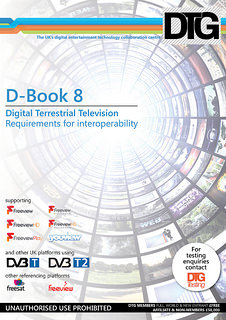UK's DTG releases D-Book 8
Friday, March 27th, 2015
DTG underpins Freeview Play with D-Book 8, the DTT requirements for interoperability in the UK
The DTG has given the UK digital terrestrial TV industry the tools to support Freeview Play and manage the Ofcom-announced 700MHz clearance with the launch of D-Book 8.

The 2015 revision of the D-Book also includes support for potential future HEVC broadcasts, a new method to deliver software updates via broadband, smart retuning, and hundreds of minor updates to maintain the interoperability requirements of the DTT platforms.
At almost 152,000 words and covering more than 500 pages, D-Book 8 represents thousands of man-hours of work by more than 50 contributors from across the industry, for this annual update alone.
Richard Lindsay-Davies, chief executive of the DTG, said: “The D-Book 8 is a milestone for digital terrestrial TV in the UK, laying the groundwork for a new generation of connected TVs and set-top boxes.
“I’d like to thank the industry for its continued hard work on standards which will maintain the relevance of digital terrestrial TV to consumers through a changing spectrum environment and its evolution into a hybrid platform.”
Jonathan Thompson, chief executive of Digital UK, said: “The DTG’s development of the D-Book has been essential to the success of the digital terrestrial television in the UK. As DTT evolves for the connected age and prepares for an era of increased spectrum sharing, this latest edition will ensure consumers choosing Freeview get the best possible viewing experience.”
The D-Book 8 covers the changes to broadcast metadata which are required to ensure that Freeview Play devices work correctly, and that other DTT devices are unaffected by the new services.
Freeview Play is based on the global HbbTV 2.0 (Hybrid Broadcast Broadband TV) specification for connected TV services, which itself uses a specifications developed for the D-Book 7 Part B published in 2012.
Over the air signalling of software updates via broadband allows manufacturers to instruct STBs and TVs to go online for large update files, or instruct users to connect their products to receive the update.
Smart retuning ensures that products will retain users’ favourite channel lists, region selection and recording schedules when the channel list is updated.
There is also a requirement for manufacturers to provide an industry-agreed standard method for displaying signal strength and quality, so that customer services can respond more effectively to reliable data.
While there is no plan to broadcast services using HEVC on digital terrestrial TV in the UK, the recommended support for HEVC-signalled services will give manufacturers an additional opportunity to extend product life as the platform evolves.
The D-Book 8 not only supports the Freeview and YouView platforms, it is also an essential reference for other UK platforms based on DVB-T and DVB-T2, such as EE TV, and is referenced by Freesat and the Freeview platforms in Australia and New Zealand.
The tools for Freeview Play have been created alongside DTG Testing’s development of test suites to ensure products for the new platform continue deliver the high standards of reliability for which Freeview is recognised.
Latest News
- Barb to start reporting TV-set viewing of YouTube channels
- SAT FILM selects multi-DRM from CryptoGuard
- Qvest and ARABSAT to launch OTT streaming platform
- ArabyAds & LG Ad Solutions partner with TVekstra in Turkey
- Freeview NZ satellite TV service to move to Koreasat 6
- Comscore expands YouTube CTV measurement internationally
